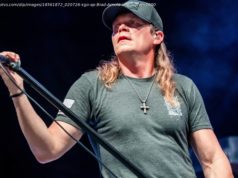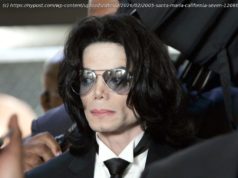Bono and his U2 brothers show words, music retain emotional, political heft 30 years after ‚Joshua Tree’s release.
PASADENA, Calif. — Thirty years can’t dull searing music, hopeful lyrics or the captivating Irish band behind them.
U2 — lead singer Bono, guitarist and keyboardist The Edge, bassist Adam Clayton and drummer Larry Mullen Jr. — proved that Saturday with a powerful two-hour show at a packed Rose Bowl, a celebration of 1987’s The Joshua Tree, the band’s biggest-selling album.
Like the hardy plant that gives the album its name — a uniquely beautiful survivor in the unforgiving, nearby California desert — the Dublin quartet persists. They’re older, not immune to the sands of time, but they can still put on a show, as they showed in this early stop on the 18-city North American leg of the tour.
The album’s songs, written during the Reagan era, comment on such issues as militarism and greed (Bullet the Blue Sky) and the power of women (Mothers of the Disappeared) . Although the name Trump was never explicitly mentioned, save for a clip from a 1950s TV Western featuring a snake-oil salesman named Trump who promises to build a wall, Bono, commenting between songs, made clear the album’s words remain relevant today. Don’t expect him to be playing any Trump events.
The 11-track masterwork, played in original album order and serving as a centerpiece for a 23-song effort bracketed by earlier and later hits, represents the band’s tribute to enduring values of justice and human rights symbolized, if not always achieved, by America.
A six-song opening effort, which featured black-clad band members walking individually down a runway to a front stage shaped like a Joshua Tree, immediately got fans in the mood with 1983’s Sunday Bloody Sunday, a plaintive yet combative comment on political violence in their homeland.
After moving to the main stage to begin the Joshua Tree portion, the band performed in front of a massive, 200-foot-wide video screen featuring stunning video of America’s deserts, mountains and diverse population. The Edge’s instantly identifiable guitar opening of Where the Streets Have No Name, a rhythmic buildup of nervous energy that explodes into Bono’s defiant lyrics, transfixed concertgoers.
That led into I Still Haven’t Found What I’m Looking For, with Bono’s yearning vocals conveying a never-ending search for meaning, and then another huge hit, With or Without You. Bono implored the crowd to join in on the familiar „Oh! – oh, oh“ between lyrics.
Bono dedicated the softer, sweet-sounding Running to Stand Still, which featured him on harmonica, to Soundgarden’s Chris Cornell, who died last week: „For the lion that was Chris Cornell, we send a prayer.“
Red Hill Mining Town, a Joshua Tree song played in concert for the first time on this tour, was inspired by a 1980s miners‘ strike in England, but Bono finds its message of worker persistence amid hardship resonant in contemporary America.
„Sometimes, songs become themselves years later, “ he told the crowd. „This feels right for the moment we’re in.“
In God’s Country, a potent homage to America’s physical beauty and the power of its ideals, featured an emotional performance by the lead singer, who held up his arm in tribute to the Statue of Liberty when singing, „She is liberty, and she comes to rescue me.“
Encore songs made clear that the band’s creative energy didn’t dissipate after Joshua Tree. Two from 2000 — Beautiful Day, whose electric vibe was accompanied by streaming colors on the video screen, and Elevation, in which Bono fittingly powered up his voice — would have brought concertgoers to their feet if they weren’t already there.
Ultraviolet (Light My Way) honored women, with pictures of historic trailblazers (Rosa Parks) and modern-day role models (Michelle Obama, Hillary Clinton) earning applause. One (also the name of a U2-supported campaign that fights poverty and disease) featured a fierce, aching Bono vocal, leading to an endorsement of political organizing and social movements.
Miss Sarajevo, a 1995 tribute to civilian victims of a withering siege, was accompanied by a specially commissioned film featuring a current-day teenage Syrian refugee hoping to come to an America of civility and opportunity — a place where a fabled tree can sustain even under the harshest of conditions.






